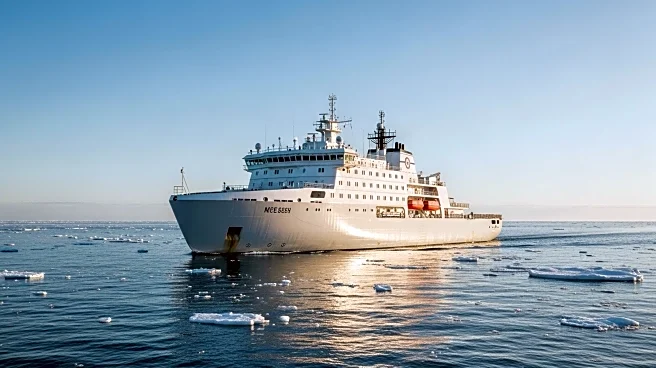What's Happening?
South Korea is advancing its Arctic shipping strategy by providing financial support for the construction of ice-class vessels. Oceans Minister Chun Jae-Soo announced the initiative, which aligns with President Lee Jae Myung's campaign to leverage Arctic shipping to boost the country's southern ports. The Ministry of Oceans and Fisheries has allocated $5.2 billion for the 2026 financial year, marking an 8.4% increase from the current budget. This funding will facilitate the expansion of Arctic shipping routes and the construction of ice-class vessels. South Korean shipbuilders, including Hanwha Ocean and Samsung Heavy Industries, are experienced in constructing such vessels, having previously delivered icebreakers for Russian projects. The government plans to invest $8 million per vessel with icebreaking capabilities, aiming for operations to commence in the Arctic by 2030. Additionally, $1.1 billion is allocated to upgrade ports like Busan, Yeosu, and Gwangyang to handle Arctic shipping, positioning the southern region as a global maritime hub.
Why It's Important?
The initiative to support ice-class vessel construction is crucial for South Korea's maritime industry, as it seeks to capitalize on the growing Arctic shipping routes. By enhancing its port infrastructure and fleet capabilities, South Korea aims to establish itself as a key player in global maritime trade, particularly along the Northern Sea Route. This move could significantly boost the country's economy by attracting more shipping traffic and related business activities to its southern ports. The investment in ice-class vessels also reflects South Korea's strategic interest in the Arctic, a region with increasing geopolitical and economic importance due to climate change and melting ice caps. The development could lead to increased competitiveness in the shipping industry, benefiting local shipbuilders and related sectors.
What's Next?
South Korea plans to start pilot operations in Arctic shipping next year, with icebreakers expected to begin operations by 2030. The Ministry of Oceans and Fisheries will relocate to Busan to demonstrate its commitment to revitalizing the maritime sector in the southern region. As the Arctic shipping routes expand, South Korea will continue to upgrade its port facilities to accommodate the anticipated increase in shipping traffic. The government will likely engage with international partners to further develop its Arctic strategy and ensure sustainable growth in the region.









